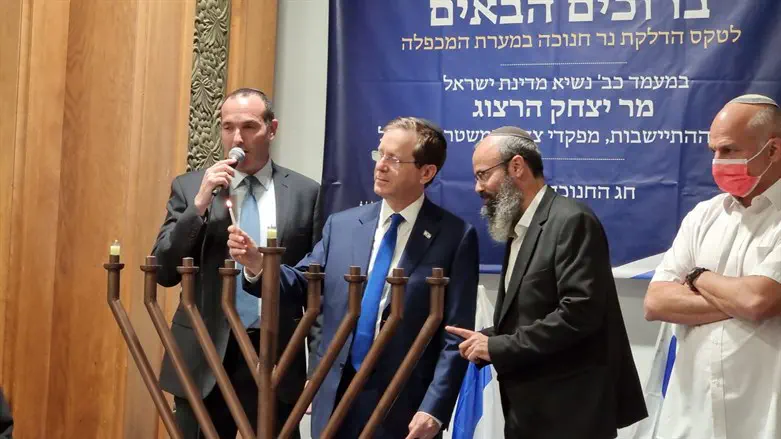
(JNS) My most deeply embedded memory of Hanukkah was implanted nearly 50 years ago. Returning to Jerusalem from a journey through Sinai in time for the eighth night, I wondered if there might be a special celebration at the Western Wall. Arriving at the Western Wall plaza with my young children, we found it tightly packed with people. There was a palpable feeling of anticipation. We waited eagerly. Suddenly, there was a loud “whoosh” as eight vats of oil atop the wall simultaneously burst into flame. Spontaneously everyone began to sing “Maoz Tzur.” I felt shivers of awe and tears of joy.
Fast-forward to the first night of the current Hanukkah celebration. Asserting that the Jewish connection to Hebron is “unquestionable,” Israeli President Isaac Herzog lit the first candle for the menorah at Me’arat HaMachpelah, the ancient burial site of the Jewish patriarchs and matriarchs. As he emphatically stated: “The historic connection of Jews to Hebron, to the tomb of the patriarchs, to the heritage of the patriarchs and matriarchs is unquestionable.” And, he might have noted, Hebron was the first capitol of the Jewish people in their promised land.
Predictably, as The Times of Israel reported, infuriated left-wing Israeli protesters found little to celebrate and much to castigate. Representatives from Peace Now, Breaking the Silence and Mothers Against Violence preposterously accused Israel of apartheid and Herzog of encouraging “non-stop violence by settlers, under which the Palestinian residents of the city live.”
Blatant bias aside, the protesters demonstrated their astonishing ignorance of Hebron history and demography. Not only is it a revered burial site; it is where King David ruled before relocating his throne to Jerusalem. There were no Muslims there, or anywhere, for more than a millennium.
Currently, 700 Hebron Jews inhabit a tiny enclosed and shabby neighborhood surrounded by 200,000 Muslims in the modernized and prosperous Arab sector. Indeed, Jews are outnumbered by Arabs in their own constricted quarter. The notion that Hebron Arabs live under the rule of Jewish “settlers” is a striking demonstration of ignorance and bias.
Prior to the president’s visit, Hamas leaders had warned that celebration of the first night of Hanukkah in Machpelah was a “provocation” and “a flagrant violation” of Hebron sanctity. Urging Palestinians to confront Israeli soldiers who were guarding the massive enclosure, they absurdly claimed that “the occupation bears full responsibility for the repercussions of this attack.” In translation, Jews were to blame for Arab violence.
Mossi Raz, a Knesset member from the left-wing Meretz Party, affirmed the Hamas slander. Blocked by police from protesting in Kiryat Arba—the Jewish neighborhood up the hill from Hebron—he cited this as proof that “Hebron is not part of Israel.” A more persuasive claim might be that Meretz is so appallingly ignorant of Jewish history that it, not Hebron, is not part of Israel.
They might better divert their fury for a brief history lesson.
The millennia-old Hebron Jewish community was destroyed in 1929 by Arab rioters who rampaged through the Jewish Quarter, savagely murdering men, women and children because they were Jews. Three children under the age of 5 were slaughtered, one of whom had his head torn off. Teenage girls, mothers and grandmothers were raped. Yeshivah students had their throats slit. Sixty-seven Jews were brutally murdered; six synagogues were desecrated; dozens of Torah scrolls were mutilated. Not until Israel’s victory in the 1967 Six-Day War nearly four decades later did Jews begin to return to live in their ancient holy city.
The irrefutable facts of Jewish history affirm Herzog’s choice of the Machpelah burial site to light the first Hanukkah candle. Not even Jerusalem has the ancient claim to the Land of Israel that makes Hebron not only “part of Israel” but its biblical foundation. How sad that Israeli leftists are determined to deprive themselves of a joyous Hanukkah celebration.
Jerold S. Auerbach is the author of 12 books, including “Hebron Jews: Memory and Conflict in the Land of Israel” (2009).